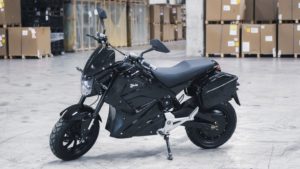São Paulo – Founded in 2022, Mileto Tech Motors hits the market with the prospect of launching the cheapest electric vehicles (EVs) in Brazil. The Brazilian Autotech – auto industry startup – was born in Rio de Janeiro state but plans to arrive soon in all the major cities of Brazil with concept stores – some including technical support – so consumers can see and test the cars. And in three to four years, it aims to start exporting its products.

Destinations abroad have not yet been studied, but the desire to go outside the country and do international business exists in the vision of Alexandre de Oliveira, a professional with over 20 years of experience in the financial market, manager, and one of Mileto’s partners. “The EV market has been growing worldwide, and companies are consolidating; the idea is to follow this trend. And also, depending on the investors, if you have a foreign fund you want to get investment from, you will also want to sell there,” explained Alexandre.
The entrepreneur aims to receive foreign investment. Partners Alexandre and Felipe de Oliveira, his brother, intend to make an investment round in the first quarter of 2023 to raise around BRL 40 million (about USD 7.6 million at the current rate) to expand the business. Among the funds already interested in Mileto’s business, one is from Dubai.
“We are in talks with eight Brazilian funds, but nothing is closed yet. We are preparing the round and want them to learn more about the company. When the round opens, any company will be eligible to participate, national or foreign, and welcome to contribute to the company in financial and technical aspects,” said one of Mileto’s partners.
Prospectively, the company may also make an Initial Public Offering (IPO) to have its shares traded on the stock exchange.
Alongside his brother, a polymer engineer with over 25 years of experience in the auto market, Alexandre started the company’s project two years ago. The idea got off the ground earlier this year with the arrival of two Brazilian partners. With the investment, the brothers opened their first factory in the city of Porto Real, in Rio de Janeiro, with 20 employees, and will soon open their first store in Resende, in the same state.

In November, electric motorcycles and minitrucks (utility vehicles) began to be sold. The expectation is by the first quarter of 2023, electric passenger cars, awaiting government authorization, will also hit the streets of the country.
All products can be charged at 220W household sockets, with estimated power consumption costs of BRL 800 (about USD 152) per year (similar to a refrigerator). In houses with photovoltaic solar panels, the cost could be zero. In addition, customers would also save on maintenance, which would be limited to replacing mechanical components such as tires and brakes, and exemption or reduction of vehicle taxes in over 10 Brazilian states.

In addition to cars, motorcycles, and electric utility vehicles, the company aims to invest in a new product in Brazil, printed cars. Mileto was inspired by two automotive brands from Italy and the Netherlands, which already sell this type of vehicle.
The idea is to start sales of the innovative product in 2024. Alexandre says he is currently working with Brazilian companies producing test parts but intends to bring 3D printing technology to Mileto and develop the production of cars at the plant. The partner desires to be able to initially sell the printed car model at a price of around BRL 70,000 (about USD 13,295). To make it even cheaper, in the future, the company would sell the car without a battery, with battery models sold separately.
Among the upcoming prospective releases are the car and solar minitruck. These vehicles are expected to start selling in the first half of 2023. “Unlike some models launched in Brazil, it will not have a photovoltaic panel; it will be like a photovoltaic adhesive so that it will stick to the car’s design,” explained Alexandre. “It is still in the testing phase, but we estimate it will charge 50% of the battery after around eight hours in the sun. If the car has a range of 310 km, with that time under the sun, it would already travel 160 km with clean and free energy.”
In addition to solar charging, the two models of solar cars can also charge from a power outlet.
Mileto products
Among the products that Brazilians love the most is the automobile. According to the 2019 National Household Sample Survey (PNAD) by the Brazilian Institute of Geography and Statistics (IBGE), cars are present in almost half (49.2%) of households in the country.
And more and more consumers are giving preference to EVs. The Brazilian National Association of Motor Vehicle Manufacturers (ANFAVEA) predicts by 2035, 62% of vehicle sales in Brazil will be EVs.
Mileto’s motorcycles have three models and are sold starting from BRL 19,000 (about USD 3,608). Complete charging takes three to five hours and guarantees the autonomy to run 70 km. The motorcycle engine has 3000W of power, and the maximum speed is 90 km/h.
“We import parts for motorcycles and SUVs from China, assembled in our factory. The east is light years ahead in technology, and the idea is to bring this to people to begin to understand and produce here in the future,” says Alexandre.
For motorcycles, the plan is to create daily, weekly, and monthly subscription plans this month, initially just for companies. The daily rental price could be around BRL 26 (about USD 4.93). By the end of the first quarter of 2023, plans are expected to be made available to the general public so consumers can have an experience before purchasing the product.
The minitruck, sold from BRL 98,000 (about USD 18,612), has a capacity for up to 800 kilos of cargo, zero carbon dioxide (CO2) and noise emissions, a high range of up to 150 km, and an engine with 5KW of power. Users must charge it for six to eight hours to run the entire range.
Even with few units of motorcycles and minitrucks sold online, Alexandre is not worried, as he wants to invest in B2B. By December, over 160 motorcycles are expected to be sold to companies in different areas, such as logistics, delivery, and retail.
As for the cars, which will be sold from BRL 100,000 (about USD 18,993), buyers can join a waiting list on the website. The cars will have two models, Mileto Primis and Mileto Duo, with ranges of 260 km and 310 km, respectively, and a full charge in six to eight hours. At malls or gas stations quick charge stations, charging could take just 30 minutes. Both models will be able to reach a speed of 110 km/h.
*Special report by Rebecca Vettore for ANBA.
Translated by Elúsio Brasileiro




